
Ribes sanguineum, the flowering currant, redflower currant, red-flowering currant, or red currant is a North American species of flowering plant in the family Grossulariaceae, native to the western United States and Canada.
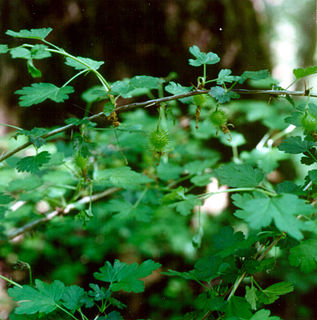
Ribes echinellum, the Miccosukee gooseberry, is a very rare North American shrub in the currant family, native to the southeastern United States. It has only a few known populations. The Florida populations were discovered first, in 1924 at Lake Miccosukee. The South Carolina populations were found in 1957 and 1981, and the first is protected at Steven's Creek Heritage Preserve.
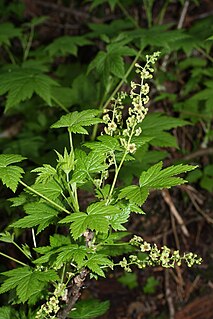
Ribes bracteosum, the stink currant, is a species of currant native to western coastal North America from southeastern Alaska to Mendocino County in California.

Ribes menziesii, the canyon gooseberry, is a species of currant found only in California and Oregon. There are five to six varieties of the species found across the low elevation mountains of California, especially the Coast Ranges, and the coastal canyons and foothills, into southern Oregon. It can be found in the chaparral plant community.
Crepis monticola is a North American species of flowering plant in the family Asteraceae known by the common name mountain hawksbeard.

Ribes aureum, known by the common names golden currant, clove currant, pruterberry and buffalo currant, is a species of flowering plant in the genus Ribes. It is native to Canada, most of the United States and northern Mexico. The variety Ribes aureum var. villosum is sometimes considered a full species, Ribes odoratum.

Ribes missouriense, the Missouri gooseberry, Missouri currant or wild gooseberry, is a prickly, many-stemmed shrub native to the north-central United States. Scattered populations have been found farther east, most of them very likely escapes from cultivation.

Ribes glandulosum, the skunk currant, is a North American species of flowering plant in the currant family. It is widespread in Canada and is also found in parts of the United States.

Ribes cereum is a species of currant known by the common names wax currant and squaw currant; the pedicellare variety is known as whisky currant. The species is native to western North America.
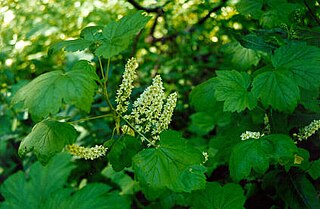
Ribes hudsonianum is a North American species of currant, known by the common name northern black currant.

Ribes roezlii is a North American species of currant known by the common name Sierra gooseberry.
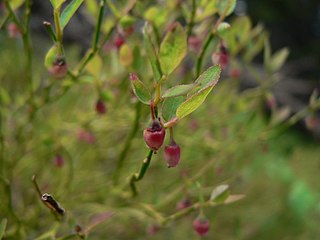
Vaccinium scoparium is a species of huckleberry known by the common names grouse whortleberry, grouseberry, and littleleaf huckleberry.

Ribes americanum is a North American species of flowering plant in the gooseberry family known as wild black currant, American black currant, and eastern black currant. It is widespread in much of Canada and the northern United States.

Crepis barbigera is a North American species of flowering plant in the family Asteraceae. It is native to the northwestern United States. It has been found in Washington, Oregon, and Idaho.
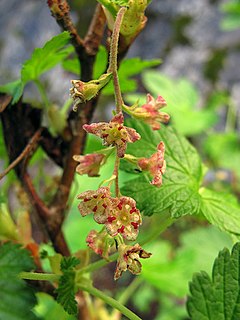
Ribes acerifolium is a North American species of currant known by the common names mapleleaf currant and maple-leaved currant. It is native to the Canadian Province of British Columbia as well as to the northwestern United States.

Ribes curvatum is a North American species of currant known by the common names granite gooseberry, drooping gooseberry and Georgia gooseberry. It is native to the southeastern and south-central United States, and can be found in habitats ranging from dry rocky slopes to rich woodlands.

Ribes diacanthum, the Siberian currant, is an Asian species of currant. It is native to northeastern Asia. The species is also sparingly naturalised in the Canadian Province of Manitoba, having escaped in the 1940s from an agricultural experiment station near Brandon.
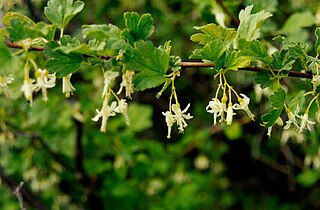
Ribes niveum is a North American species of currant known by the common names snowy gooseberry, white-flowered gooseberry, or snow currant. It is native to the western United States.
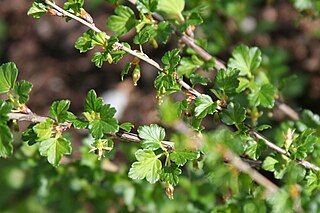
Ribes rotundifolium is a North American species of currant known by the common names wild gooseberry and Appalachian gooseberry. It is native to the eastern United States, primarily the Adirondacks, from Massachusetts and the Appalachian Mountains south as far as South Carolina and Tennessee.

Ribes wolfii is a North American species of currant known by the common names Wolf's currant and Rothrock currant. It is native to the western United States. The distribution is disjunct or discontinuous, with two distinct concentrations of populations separate by a gap of over 320 km. One is in northern Idaho, northeastern Oregon, and southeastern Washington. The other is in Utah, Colorado, Arizona, and New Mexico. There is also a report of an isolated population south of the border in Chihuahua, Mexico.


















